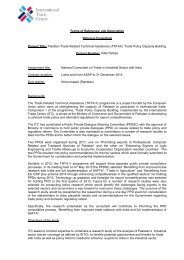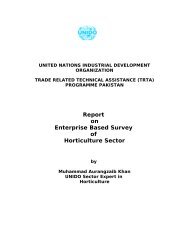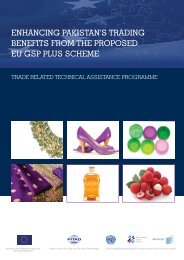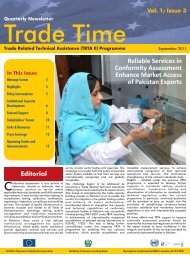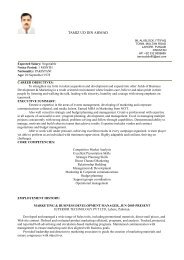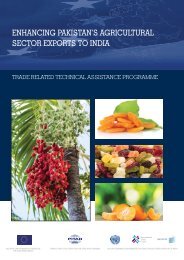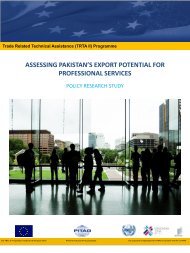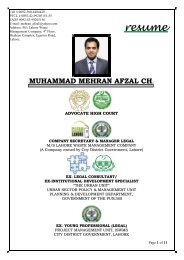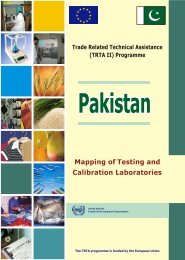Enhancing dairy sector export competitiveness - International Trade ...
Enhancing dairy sector export competitiveness - International Trade ...
Enhancing dairy sector export competitiveness - International Trade ...
Create successful ePaper yourself
Turn your PDF publications into a flip-book with our unique Google optimized e-Paper software.
ENHANCING DAIRY SECTOR EXPORT COMPETITIVENESS IN PAKISTANThe Agreement on the Application of Sanitary and Phyto-Sanitary Measures (SPS)The Agreement on Sanitary and Phyto-Sanitary Measures (SPS) came into force with the establishment ofthe WTO on January 1, 1995. The main objective was to establish international regulations that wouldensure supply of ‘safe’ food, as per appropriate standards, in a way that they may not be used as a meansto protect the domestic producers by the member countries. Hence the SPS Agreement sets out basicrules for how countries may enforce their domestic food safety and animal and plant health measures.Nevertheless, these regulations must be based on scientific justifications and the prevailing internationalstandards. Member countries may set higher standards for health safety under the agreement but theserules cannot be enforced arbitrarily between <strong>export</strong>ing countries where identical or similar conditionsprevail. The SPS measures under the agreement are defined as any measures that are used:(i) “to protect human or animal life from risks arising from additives, contaminants, toxins ordisease-causing organisms in their food;(ii) to protect human life from plant- or animal-carried diseases;(iii) to protect animal or plant life from pests, diseases, or disease-causing organisms;(iv) to prevent or limit other damage to a country from the entry, establishment or spread of pests.”The SPS agreement covers all food safety and hygiene measures such as control of veterinary residues,pesticide residues and other chemical/food additives used in food production. However, the measures toensure environmental protection, protection of consumer interest, and the welfare of animals are notcovered under this agreement. Specific regulations regarding these can be found in the Agreement onTBT.The key features of the SPS Agreement are as following:i. Basic Rights and Obligations: As per Article 2, members have the right to take SPS measures to protecthuman, animal or plant life which are consistent with those provided in the agreement but which donot arbitrarily discriminate between members having same or similar condition or would serve as ameans to unjustifiably restrict trade.ii.iii.iv.Harmonization: Under Article 3, member countries are encouraged to harmonize their SPS measures tointernational standards, guidelines and recommendations as much as possible. Higher standards maybe applied by member countries but on the basis of scientific justification.Equivalence: Under Article 4, member countries should recognize and accept the SPS measures ofother member countries even if they differ from their own if they can be objectively demonstrated bythe <strong>export</strong>ing country that the measures are appropriate as per the importing country’s standards.Adapting to Conditions: Article 6 takes into account that the local conditions amongst member countriesmay vary to a large extent, including climatic conditions, existing diseases and pests and food safetyconditions, and therefore the same SPS standards cannot be applied at the same level.v. Risk Assessment and Determination of Appropriate Level of SPS Protection: The agreement throughthe provisions of Article 5 encourages member countries, while enforcing SPS measures in theirdomestic regimes, should be as transparent as possible for assessing the risks. In case a membercountry deems that the SPS measures put in place by another member country are restrictive totrade, the member country maintaining such standards would provide an explanation the necessity formaintaining such levels based on the scientific justification.• Transparency: Under Article 7, the member countries are required to notify changes in their SPSmeasures which can potentially affect trade relations. The governments are also required to set upoffices called “National Enquiry Points” to respond to requests on new or existing SPS measures andthey must be open to scrutiny by other member countries as to how they apply their food safetymeasures for human, animal and plant health.59



